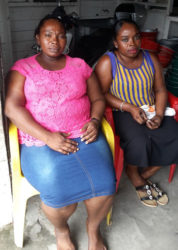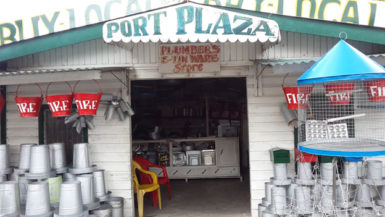Dolly and Sarah Davson are members of a third-generation Guyanese family, which over the years has been making a living making and marketing an assortment of containers out of aluminium and galvanized metal. The two sisters serve as assistants to their father, David, who, along with his other siblings, were taught the trade by their father.
The business started in West Ruimveldt and afterwards a second branch was established at 68 Barr Street, Albouystown.
These days, and for the past 19 years, the family has been trading under the name Davson & Davson Port Plaza Store at the corner of Lombard and Drysdale streets. The sisters ‘talk up’ the quality and pricing of the products they offer with an aggressive enthusiasm that gets your attention. Among the products are fire buckets, feeding cans, parrot cages, dustbin covers, cases for air-condition units, guttering, ovens, funnels, graters, cake and pastry pans and mail boxes.

Back in the day, the Davson sisters say, their grandfather used to be one of the leading lights in the tinsmith trade in the city. He had secured his reputation primarily on account of his manufacture of the one-burner kerosene stove, popular during the 60s and 70s. Eventually, the founder of the enterprise turned his attention to a broader range of products, his choices influenced by consumer demand. Wash basins, cake pans, domestic buckets, poultry feeding pans and ovens led the way.
These days, David Davson laments the fact that the difficulties he faces in sourcing aluminium means that he is unable to produce the range of products for which the establishment used to be popular. The shortage of galvanized metal too has seen the company turn to a substitute product known as Galvalume, an alloy of 45% zinc and 55% aluminium which looks similar to galvanized steel. Silicone is used to help hold the component pieces of the product together.
Mindful of the enduring viability of the trade, some local business houses including Gafoors, Toolsie Persaud and Dalip Trading still import the raw material.

Technology, David says, has changed the shape of the business. Time was when the entire production process – from cutting the metal to bending and beating it into shape – was manual. These days the company employs a range of machinery. “It makes life easier,” David says. Time was when the production a fire bucket took several hours. These days, it takes half an hour, “tops.”
The Davson girls, Dolly and Sarah, are the company’s energetic salespersons. They say that in business they have learnt to roll with the punches. There are days when they sell nothing and they have learnt to live for seasonal sales. At Christmas, cake pans would ‘fly off the shelves.’ Other products have their seasons too. They make a point of saying that the Jubilee ‘season’ was good for the business.
As is the case in other trades, competition impacts on business. The introduction of plastic guttering, for example, has shrunk demand for the aluminium option. These days the Davsons only manufacture the product to order. The demand for feeding cans has also shrunk. Whereas a year ago feed can sales numbered “in the hundreds,” the Davsons say that these days they would probably sell “twenty or thirty” such cans over the same period. Sarah says, however, that fire buckets, dustbin covers, mail boxes, parrot cages continue to be good sellers.
The sisters say that they have learnt to live with the reality that these days the company’s products are in competition with imported ones. They, however, continue to place their faith in the quality of their products and in customer loyalty. They are confident that the company will continue to hold its own on the Guyana market.
At the same time they understand that survival and growth are linked to them remaining on top of their game. They talk about training and about the availability of workers. One of their concerns is with the rate of staff turnover. Workers come and go, taking advantage of the opportunity to learn a skill then eventually leaving to start business of their own. It is, they say, one of the occupational realities of the business.
The fact that a male sibling, Quincy, is part of the business, encourages them. They believe it points to the continuity of the business, at least into a fourth generation. They are, they say, prepared to stay the course, to have confidence in their reputation and to understand the ups and downs of business. Quitting or shifting to another form of business is not, they say, an option, at least not at this time.




